Table of Contents
- Introduction
- Understanding Hair Loss
- The Link between Diet and Hair Loss
- Essential Nutrients for Healthy Hair
- Foods that Promote Hair Growth
- Dietary Factors that May Contribute to Hair Loss
- Maintaining a Balanced Diet for Healthy Hair
Introduction
Proper nutrition plays a crucial role in maintaining overall health, including the health of our hair. In this article, we will delve into the impact of diet on hair loss and the vital connection between nutrition and healthy hair growth.
Understanding Hair Loss
Hair loss is a common concern for both men and women. This section will explain the various factors that contribute to hair loss, including genetics, hormonal imbalances, and external stressors.
Hair loss is a common concern for many individuals. It can affect both men and women, causing them to worry about their appearance and overall well-being. While genetics, hormonal imbalances, and medical conditions can play a role in hair loss, there is evidence suggesting that diet can also have an impact on the health of our hair.
The old saying, "You are what you eat," holds some truth when it comes to the condition of our hair. Our hair follicles require certain nutrients to function optimally and promote healthy hair growth. Lack of these essential nutrients in our diet may contribute to hair loss or weak hair.
Protein, for instance, is a building block of our hair. It provides strength and structure to our strands. Consuming an inadequate amount of protein can lead to hair becoming brittle and prone to breakage.
Iron is another nutrient that plays a crucial role in hair health. Iron deficiency can lead to anemia, which has been linked to hair loss. Including iron-rich foods like lean meats, leafy green vegetables, and legumes in your diet can help ensure proper iron levels and potentially prevent hair loss.
Omega-3 fatty acids, commonly found in fatty fish like salmon, mackerel, and sardines, are also beneficial for hair health. These healthy fats help nourish the scalp, reducing inflammation and promoting hair growth. Consuming enough omega-3 fatty acids through diet or supplements may help maintain a healthy scalp environment.
Vitamin C, found abundantly in citrus fruits, strawberries, and bell peppers, is vital for collagen production. Collagen is essential for the structure and strength of hair. A diet lacking in vitamin C may lead to weak and brittle hair.
Overall, while diet alone may not be the sole cause of hair loss, it can significantly impact the health of our hair. Ensuring a balanced diet that includes adequate protein, iron, omega-3 fatty acids, and vitamin C can support healthy hair growth and minimize the risk of hair loss.
Remember, if you're experiencing significant hair loss or have concerns about your hair health, it's always best to consult a healthcare professional or a dermatologist for a proper diagnosis and personalized advice.
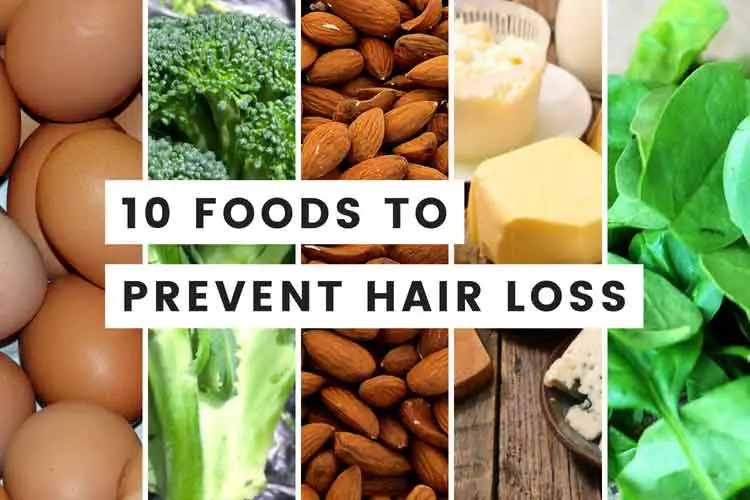
The Link between Diet and Hair Loss
Research has shown a strong correlation between diet and hair loss. Explore the direct impact of nutritional deficiencies on hair health and understand how inadequate intake of certain vitamins and minerals can lead to hair loss.
Hair loss is a common problem that can be caused by various factors, including genetics, hormonal changes, stress, and diet. While diet alone may not be the sole cause of hair loss, it can significantly impact the health of your hair.
How Does Diet Affect Hair Loss?
Your hair needs a variety of nutrients to grow and remain healthy. A well-balanced diet ensures that you receive the necessary vitamins, minerals, and proteins for optimal hair health. Deficiencies in certain nutrients can lead to hair loss or thinning hair.
Essential Nutrients for Hair Health
Protein: Hair is primarily made up of a protein called keratin. Consuming enough protein-rich foods, such as lean meats, fish, eggs, and legumes, can help promote hair growth and prevent hair loss.
Vitamin A: This vitamin helps produce sebum, an oily substance that moisturizes the scalp and keeps hair healthy. Good sources of vitamin A include carrots, spinach, sweet potatoes, and liver.
B Vitamins: Biotin, niacin, and other B vitamins are essential for hair growth and maintaining healthy hair follicles. You can find these vitamins in foods like whole grains, nuts, seeds, and leafy greens.
Vitamin C: This vitamin aids in collagen production, which is vital for hair structure and strength. Citrus fruits, strawberries, peppers, and broccoli are excellent sources of vitamin C.
Iron: Iron deficiency is known to cause hair loss. Include iron-rich foods like red meat, leafy greens, lentils, and fortified cereals in your diet to maintain iron levels and promote hair growth.
Zinc: Zinc helps regulate hormone levels and supports hair growth. Oysters, beef, pumpkin seeds, and chickpeas are some examples of zinc-rich foods.
The Importance of a Healthy Diet
While specific dietary changes may not reverse hair loss caused by genetic factors, a healthy diet can contribute to overall hair health. Incorporating a variety of nutrient-rich foods into your meals ensures that your body receives the necessary components for hair growth and maintenance.
Remember, maintaining a balanced diet along with regular exercise, stress management, and proper hair care practices are essential for preventing hair loss and promoting healthy hair growth.
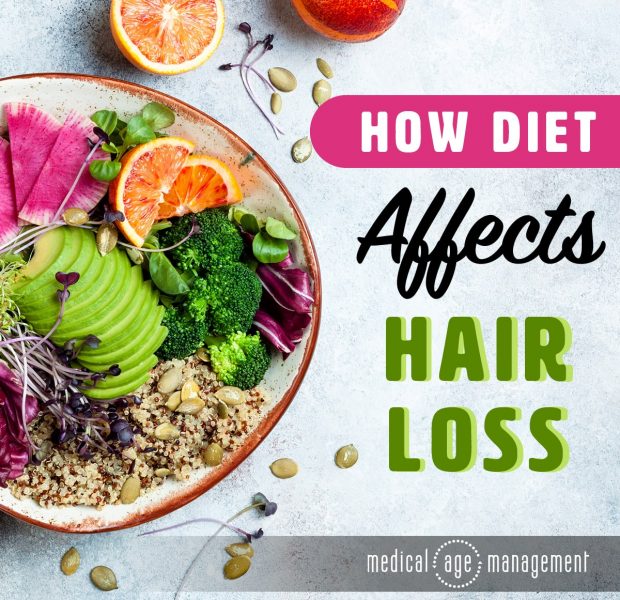
Essential Nutrients for Healthy Hair
Learn about the key nutrients necessary for maintaining strong and vibrant hair. Discover the role of vitamins such as A, C, and E, as well as minerals like biotin, zinc, and iron, in promoting hair growth and preventing hair loss.
Your diet plays a crucial role in maintaining the health of your hair. Various nutrients are necessary for healthy hair growth, and a deficiency in these nutrients can lead to hair loss. Understanding the impact of diet on hair health can help you take necessary steps to prevent hair loss.
Protein
Protein is a building block for hair as hair strands are primarily made up of a protein called keratin. Adequate protein intake promotes hair growth and strengthens the hair follicles. Include lean sources of protein like fish, chicken, eggs, beans, and lentils in your diet to support healthy hair.
Iron
Iron deficiency is a common cause of hair loss. Iron is essential for carrying oxygen to the hair follicles, promoting hair growth. Include iron-rich foods such as spinach, lentils, lean meats, and fortified cereals in your diet to maintain healthy hair.
Vitamins
Several vitamins are vital for healthy hair, including vitamin A, vitamin C, vitamin D, and vitamin E. Vitamin A helps produce healthy sebum, an oily substance that moisturizes the scalp. Citrus fruits, strawberries, and broccoli are rich in vitamin C, which aids in collagen production, promoting strong hair. Vitamin D helps stimulate hair follicles, and you can obtain it from exposure to sunlight or dietary sources like fatty fish and fortified dairy products. Lastly, vitamin E protects the hair from oxidative stress and can be found in foods like almonds, spinach, and avocados.
Omega-3 Fatty Acids
Omega-3 fatty acids are essential for hair health as they provide nourishment to the hair follicles, promoting healthy hair growth. Incorporate sources of omega-3 fatty acids like fatty fish, flaxseeds, chia seeds, and walnuts into your diet for optimal hair health.
In conclusion, a well-balanced diet rich in protein, iron, vitamins, and omega-3 fatty acids is essential for maintaining healthy hair. Ensure that your diet includes these nutrients to prevent hair loss and promote strong, lustrous hair.
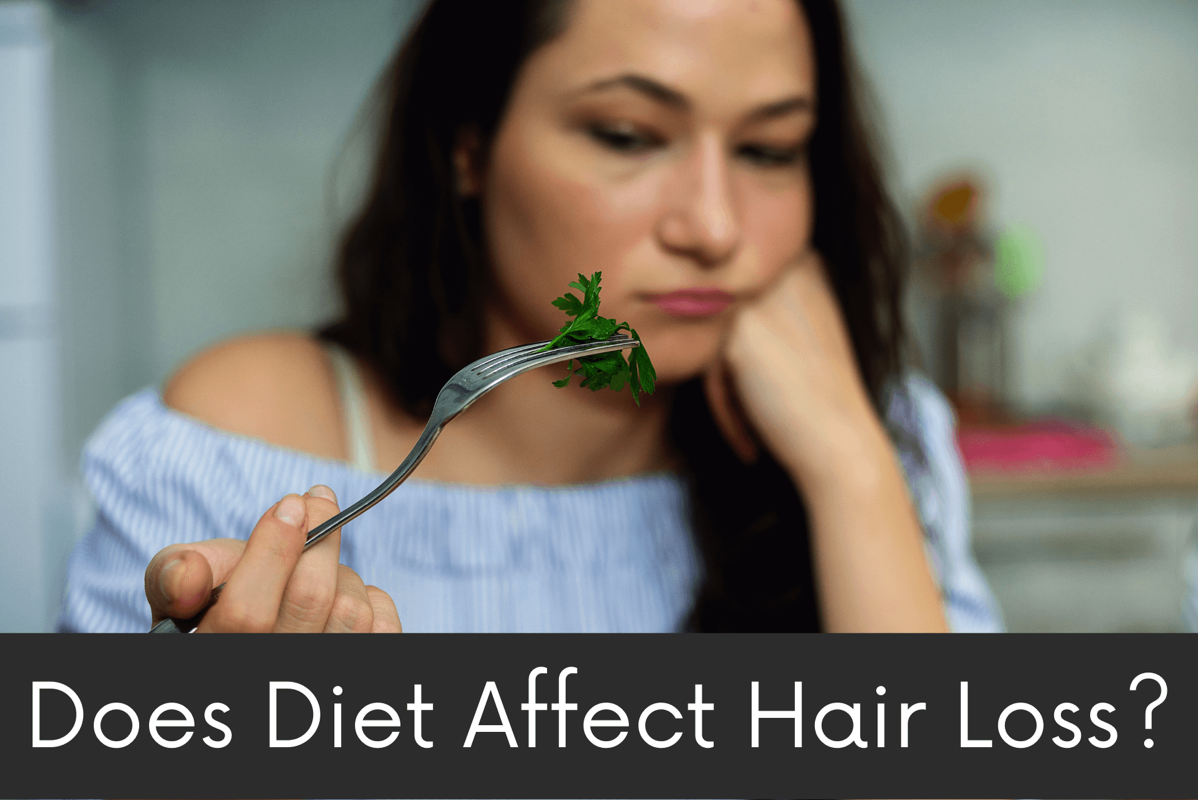
Foods that Promote Hair Growth
Certain foods are known to enhance hair growth and combat hair loss. This section will outline specific food groups, including fruits, vegetables, and proteins, that are beneficial for maintaining healthy hair.
Maintaining a healthy diet is essential not only for our overall well-being but also for our hair health. Hair loss is a common concern for many people, and it is often influenced by our diet choices. By incorporating certain foods into your diet, you can promote hair growth and improve its quality. Here are some foods that can help in promoting hair growth:
1. Eggs
Eggs are a great source of protein and biotin, both of which are important for healthy hair growth. Protein is the building block of hair, and biotin helps produce keratin, a key component of hair. Including eggs in your diet can help strengthen your hair follicles and reduce hair loss.
2. Salmon
Salmon is rich in omega-3 fatty acids, which nourish the hair and support its growth. These fatty acids are also beneficial for a healthy scalp. Consuming salmon or other fatty fish like mackerel and sardines can help keep your hair strong and prevent hair loss.
3. Spinach
Spinach is loaded with nutrients such as iron, vitamins A and C, and folate, which are all essential for healthy hair growth. Iron deficiency is known to contribute to hair loss, and consuming iron-rich foods like spinach can help prevent this problem. Additionally, the vitamin A in spinach aids in the production of sebum, a natural conditioner for the hair.
4. Nuts and Seeds
Nuts and seeds like almonds, walnuts, flaxseeds, and chia seeds are excellent sources of essential fatty acids, zinc, and vitamin E. These nutrients help strengthen the hair follicles and promote healthy hair growth. Adding a handful of nuts or seeds to your daily diet can make a noticeable difference to your hair's health.
5. Greek Yogurt
Greek yogurt is packed with protein, vitamin B5, and vitamin D. Protein helps repair and strengthen damaged hair, while vitamin B5 improves blood flow to the scalp, ensuring adequate nutrients reach the hair follicles. Vitamin D plays a role in hair follicle cycling. Including Greek yogurt in your diet can provide these beneficial nutrients for hair growth.
Yes, diet can indeed affect hair loss. A poor diet lacking essential nutrients can weaken hair follicles and lead to hair loss. Deficiencies in iron, protein, vitamin D, and omega-3 fatty acids can all contribute to hair thinning and hair loss. Conversely, a diet rich in the right nutrients can promote hair growth and improve hair quality.
In addition to consuming hair-friendly foods, it is also important to stay hydrated, manage stress levels, and avoid excessive heat or chemical treatments to maintain healthy hair. If you're experiencing significant hair loss, it is advisable to consult a healthcare professional or a dermatologist to address any underlying health issues and receive personalized advice.
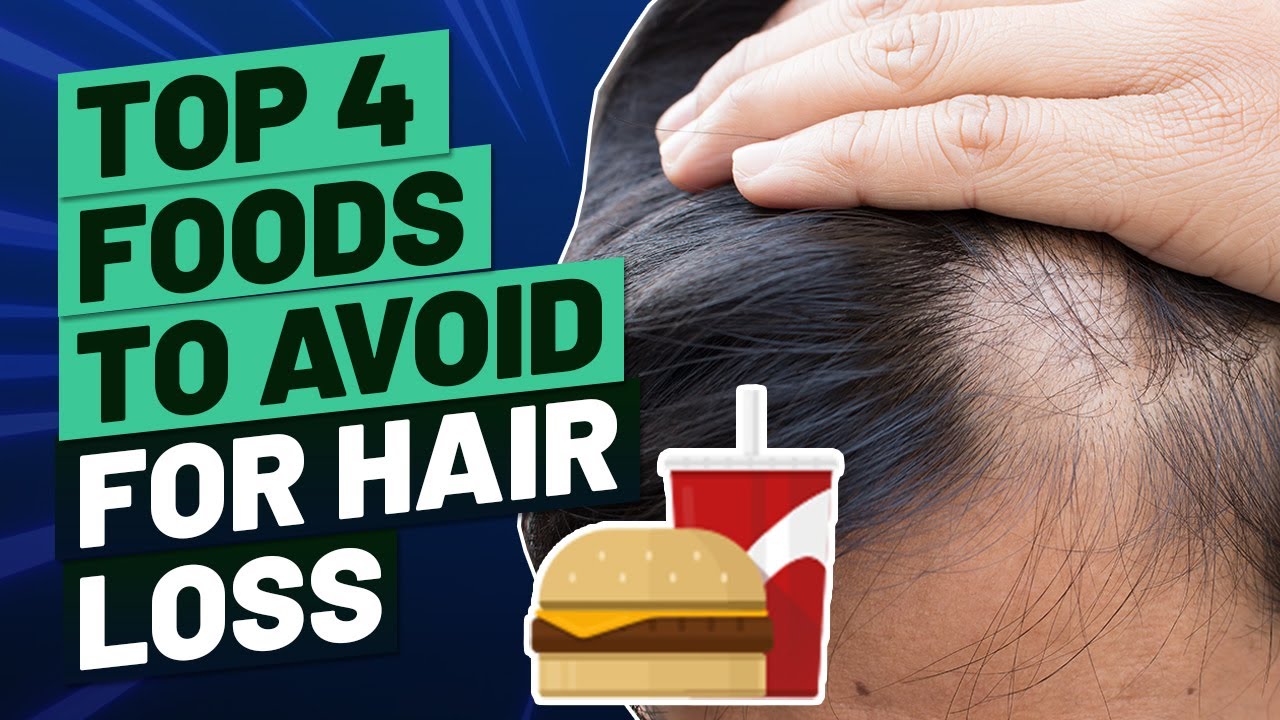
Dietary Factors that May Contribute to Hair Loss
Not all dietary choices are hair-friendly. Learn about the potential culprits that can lead to hair loss, such as excessive consumption of processed foods, high-sugar diets, and crash diets.
Hair loss is a common concern for many individuals, and several factors can contribute to it. One of these factors is diet. The food we consume plays a vital role in maintaining healthy hair. Let's explore how dietary factors can affect hair loss.
1. Nutritional Deficiencies
A poor diet lacking essential nutrients can lead to hair loss. Inadequate intake of vitamins, minerals, and proteins can weaken the hair strands, making them more prone to breakage and thinning. Nutrients like biotin, zinc, iron, and omega-3 fatty acids are particularly important for healthy hair growth.
2. Crash Dieting and Rapid Weight Loss
Engaging in crash diets or losing weight too quickly can negatively impact hair health. Severely restricting calories or following fad diets can result in a deficiency of vital nutrients. This deficiency can cause temporary hair shedding or even halt new hair growth. It's essential to adopt a balanced and gradual approach to weight loss to prevent hair loss issues.
3. High Sugar and Processed Food Intake
Consuming excessive amounts of sugar and processed foods can lead to inflammation and hormonal imbalances in the body. These factors have been linked to hair loss problems. Diets rich in processed foods lacking essential nutrients can weaken hair follicles and affect the hair growth cycle.
4. Insufficient Protein Intake
Hair is primarily made up of a protein called keratin. Insufficient protein intake can weaken the hair structure and cause hair loss. Including protein-rich foods like lean meats, fish, eggs, legumes, and nuts in your diet can help promote healthy hair growth.
5. Lack of Hydration
Staying adequately hydrated is crucial for maintaining healthy hair. Dehydration can weaken hair strands and make them more brittle, leading to hair loss. Drinking enough water throughout the day is essential for both overall health and the health of your hair.
In conclusion, a well-balanced and nutrient-rich diet is vital for healthy hair growth. Consuming a variety of fruits, vegetables, lean proteins, and whole grains can help ensure you provide your hair with the necessary nutrients it needs. It's essential to consult with a healthcare professional or a registered dietitian if you have concerns about hair loss or specific dietary needs.
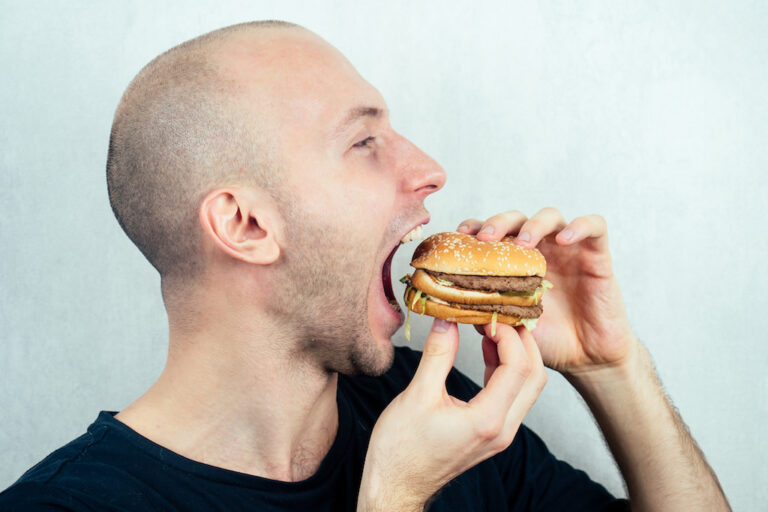
Maintaining a Balanced Diet for Healthy Hair
Find out how to maintain a balanced diet that supports healthy hair growth. Get practical tips and advice on incorporating nutrient-rich foods into your meals to ensure optimal hair health.
Many people wonder whether their diet affects hair loss. The truth is, a well-balanced diet plays a crucial role in maintaining healthy hair. Just like any other part of our body, our hair needs proper nourishment to grow and remain strong. Here are a few tips on how to maintain a balanced diet for healthy hair.
1. Eat a variety of nutritious foods
Consuming a wide range of nutrients is essential for hair health. Include plenty of fruits, vegetables, lean proteins, whole grains, and healthy fats in your diet. These foods provide vital vitamins, minerals, and antioxidants that promote hair growth and prevent hair loss.
2. Incorporate protein-rich foods
Hair strands are composed mainly of a protein called keratin. Therefore, including protein-rich foods such as eggs, fish, chicken, lentils, and Greek yogurt in your diet can significantly contribute to maintaining strong and healthy hair.
3. Don't neglect essential fatty acids
Omega-3 fatty acids are crucial for scalp health and hydration. Fish, flaxseeds, walnuts, and avocados are great sources of these healthy fats. Including them in your diet can help prevent dry scalp and brittle hair, reducing the chances of hair loss.
4. Stay hydrated
Drinking an adequate amount of water daily is vital for overall health, including hair health. Dehydration can make your hair dry and brittle, leading to increased hair loss. So, make sure to drink enough water throughout the day to keep your hair well-hydrated.
5. Limit processed foods and sugary snacks
Highly processed foods and excessive sugar intake can have a negative impact on your hair health. These foods lack essential nutrients and can contribute to inflammation, leading to hair loss. It is best to limit your consumption of such foods and opt for healthier alternatives instead.
Remember, maintaining a balanced diet alone might not solve severe hair loss issues. If you experience significant hair loss or other hair problems, it's advisable to consult a healthcare professional or a dermatologist for appropriate diagnosis and treatment.
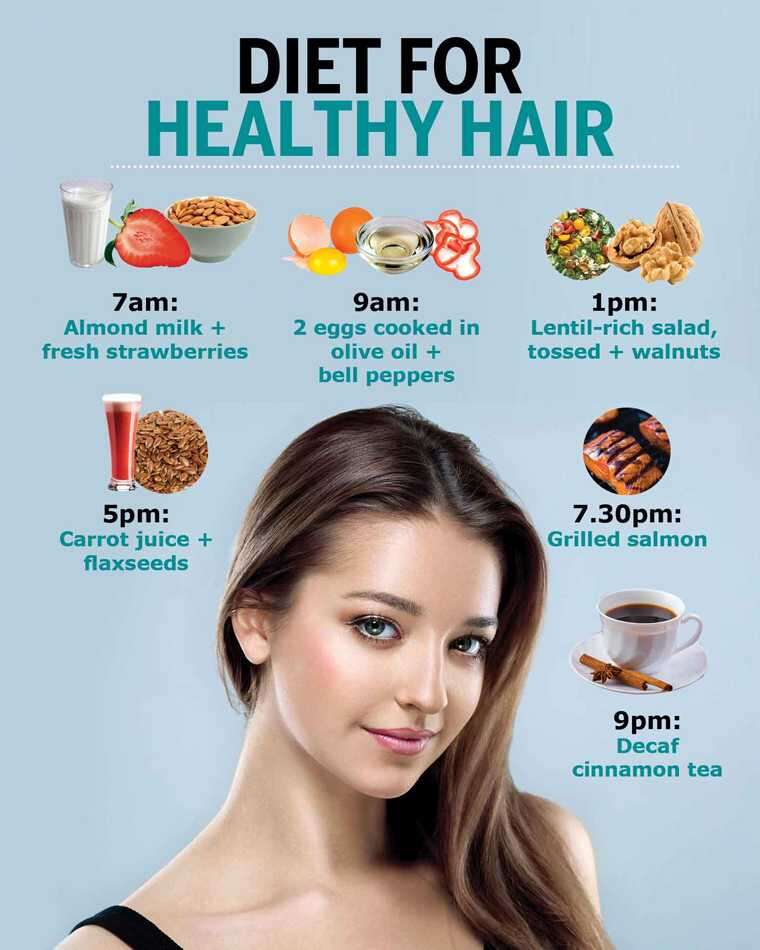
Key Takeaways
- Proper nutrition is crucial for maintaining healthy hair.
- Nutritional deficiencies can lead to hair loss.
- Certain foods promote hair growth and prevent hair loss.
- Avoiding certain dietary factors can help maintain healthy hair.
- Following a balanced diet is essential for optimal hair health.
FAQ
Q: Can a poor diet cause hair loss?
A: Yes, a diet lacking essential nutrients can contribute to hair loss. Inadequate intake of vitamins and minerals can negatively impact hair health.
Q: What foods should I eat to promote hair growth?
A: Foods rich in vitamins A, C, and E, as well as biotin, zinc, and iron, are beneficial for hair growth. Examples include spinach, eggs, salmon, and avocados.
Q: Are crash diets harmful to hair?
A: Yes, crash diets can cause nutritional deficiencies that affect hair health. It's important to maintain a balanced and sustainable eating plan.
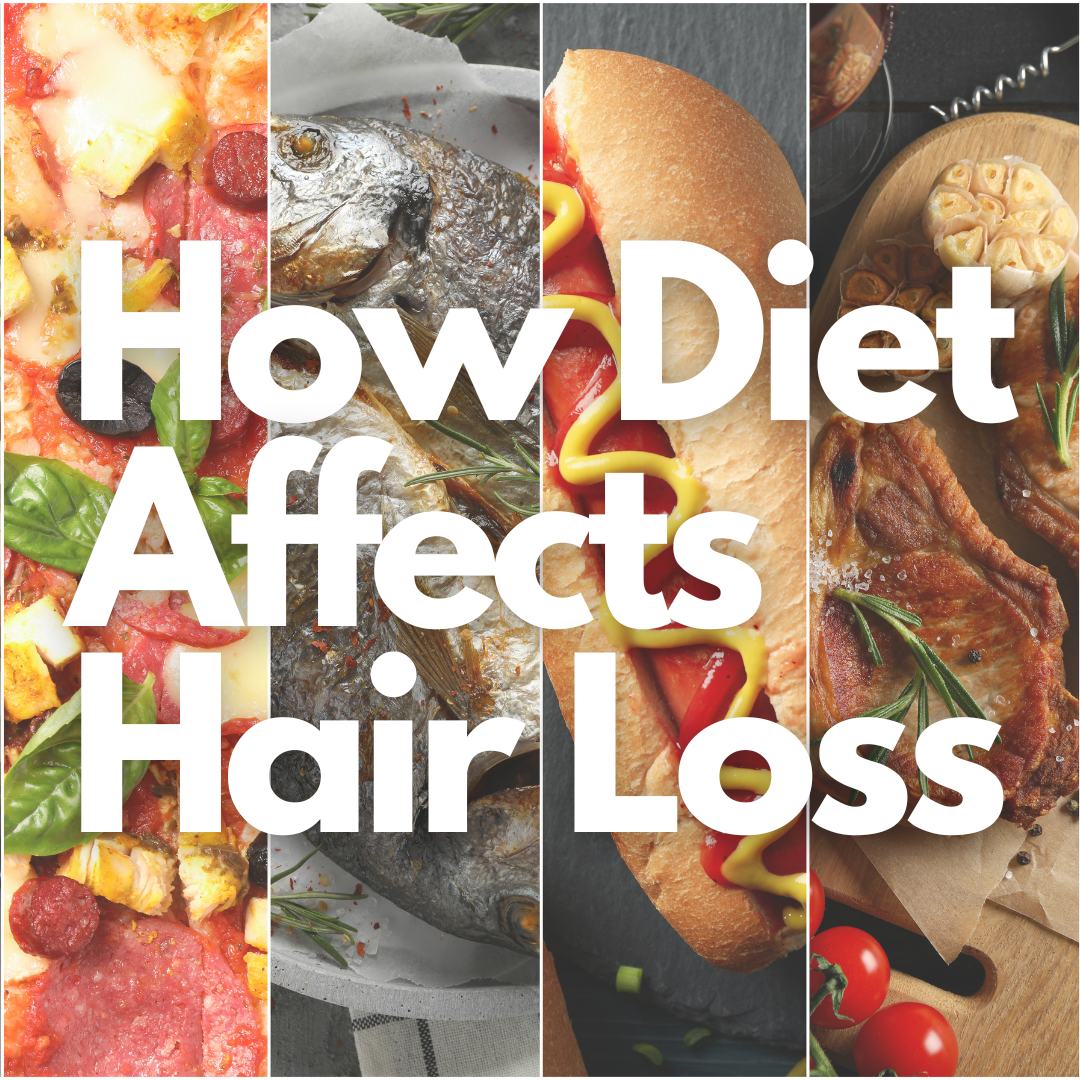


Recent Comments